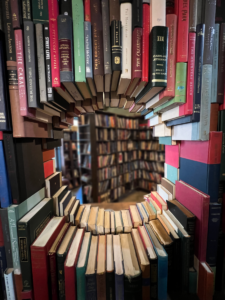Serendipity and Education
by Michelle Ferguson, Boethius Fellow
 When I first learned the word “serendipity” as a child, I knew I had made a friend for life. Not only was it the most beautiful word I had ever heard, its meaning also evoked a response from my deepest heart. How could one not love “an unexpected happy event”? As it turns out, those unexpected but joyful occurrences have done much to shape my life of learning. I have a way of running across the perfect book, the wise guidance, the excellent opportunity, when I least expect but most need it.
When I first learned the word “serendipity” as a child, I knew I had made a friend for life. Not only was it the most beautiful word I had ever heard, its meaning also evoked a response from my deepest heart. How could one not love “an unexpected happy event”? As it turns out, those unexpected but joyful occurrences have done much to shape my life of learning. I have a way of running across the perfect book, the wise guidance, the excellent opportunity, when I least expect but most need it.
Last month in Chicago I visited a used book store (each of which I am convinced is a mere hint of paradise). I chose one treasure (a hundred-year-old Aeneid in Latin, snatched eagerly since I am currently working my way through that poem), but my eyes were drawn to another book on display several shelves above: The Intellectual Life by Philip Gilbert Hamerton. Not wanting to overspend, I thumbed through it and left it behind, but later I realized that, in this age of internet resources, I might be able to locate it there – and indeed, when I arrived home and checked, it was easily found.
Hamerton was a 19th century art critic and author, and The Intellectual Life is written as a series of his letters to people in various walks of life – young students, the perpetually busy, the independently wealthy or hard-working poor – all of whom desired, in whatever capacity available, to pursue lives of learning. As I eagerly worked my way through them, I came upon the following:
The success of a teacher is not to be measured by the numbers whom he immediately influences. It is enough, it has proved to be enough in more than one remarkable instance, that a single living soul should be in unison with the soul of a master, and receive his thought by sympathy. The one disciple teaches in his turn, and the idea is propagated.
As a teacher, this is comforting; my job is simply to help students connect with masters. As a student, this is comforting because, as I grope my way toward greater understanding, I can remember the many who have also been led by those same masters.
This serendipitous book discovery then reminded me of another book I read some years ago by the same title by A.G. Sertillanges, so I searched out my notes from it. Much deeper than my book-store find, Sertillanges’ book was a treasure of advice and wisdom for learners. He has this advice for those wishing to “be in unison with the soul of a master”:
Seek out in spirit the society of friends of the true. Join their assembly, feel yourself in brotherhood with them and with all seekers, all the creators that Christianity brings together . . . each one should labor with the feeling that others are also laboring, that each one in his place should concentrate on the work while others are also concentrating . . . that the parts of the watch, to each of which a home worker devotes his exclusive attention, be put together by God.
As we wrap up our first year in the Fellows Formation program, I am thankful for the series of unexpected happy events and paths that have led me here. We have sat at the feet of masters this year – Plato, Aristotle, Euclid, Shakespeare – and we have been led to a greater and deeper understanding of four of the liberal arts. It’s and honor and a joy to walk in the steps of those who have followed this path, some to greatness, but countless others who, with whatever limited resources and abilities, used them to their best advantage and to God’s glory. We have formed a “society of friends of the true” who realize that, in Sertiallnges’ words, “Compared with men of genius we are merely children, but we are children with an inheritance. What they give us is ours because it belongs to eternity; from eternity they themselves received it.”
